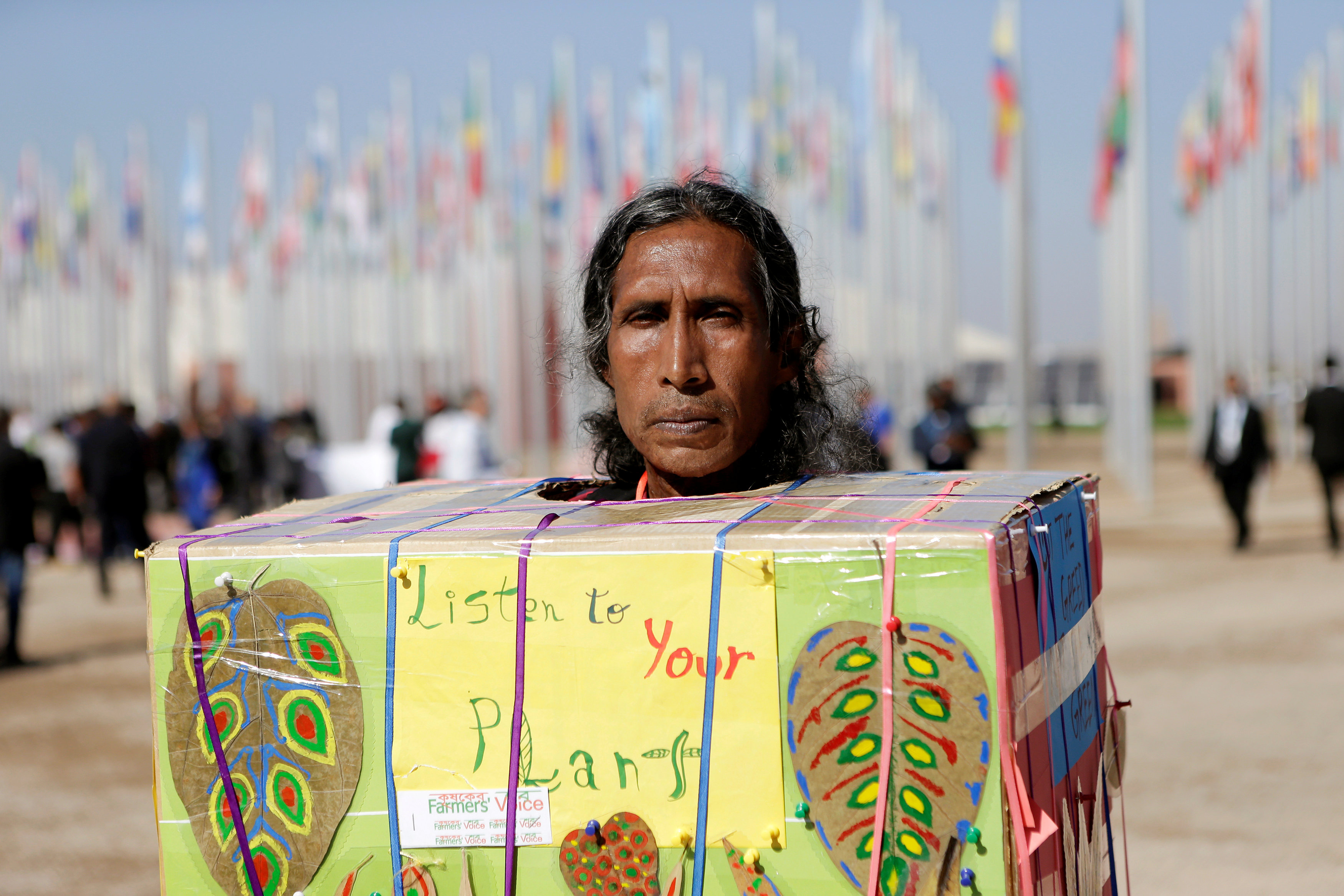Image: An indigenous man protests outside the UN Climate Change Conference 2016 (COP22) in Marrakech, Morocco, November 18, 2016. REUTERS/Youssef Boudlal
By Alister Doyle and Nina Chestney
MARRAKESH, Morocco (Reuters) – President-elect Donald Trump’s plan to quit a landmark 2015 accord to fight climate change is likely to dent rather than derail the pact, with almost 200 governments defiantly saying this week that a trend towards cleaner energy is irreversible.
The 2015 Paris Agreement, more than 20 years in the making, won a renewed vote of confidence from governments from China to Saudi Arabia and companies who foresee a shift from fossil fuels towards solar and wind power as technology prices fall.
Trump has called man-made climate change a hoax and says he will pull out of the Paris deal and will instead bolster the domestic coal, oil and shale industries. The battle between the two rival visions will shape how fast the world tackles climate change.
“An alliance from California to Germany to China is emerging and they stand for the new economy. Trump, (Turkish President Tayyip) Erdogan and (Russian President Vladimir) Putin stand for the old economy,” said Hans Joachim Schellnhuber, head of the Potsdam Institute for Climate Impact Research in Germany.
“It’s the economy, stupid, but it’s the new economy,” he said, borrowing a catchphrase of former U.S. president Bill Clinton’s successful 1992 election campaign.
Almost 200 nations at two-week talks on climate change in Marrakesh, Morocco agreed a statement on Thursday night that the fight against climate change was an “urgent duty” and “irreversible”, and reaffirming support for the Paris Agreement.
Still, Trump’s threats cast a long shadow, with worries ranging from a drying-up of U.S. climate finance for developing nations to a spread of nationalist, populist sentiment that could undermine global action to limit greenhouse gases.
Shares in First Solar Inc, the largest U.S. solar equipment maker, have fallen 7 percent since the U.S. election. By contrast, shares in U.S. coal producer Peabody, in bankruptcy proceedings, have surged 24 percent.
RISKS FOR CLIMATE ACTION
Many note that Trump has often changed positions – in 2009, he signed a call for U.S. action on climate change to avert “catastrophic and irreversible consequences”.
“I believe a wise leader will follow the historical trend and we shall have faith in that,” China’s top climate change negotiator Xie Zhenhua said. Average world temperatures this year are set to be the warmest on record, beating 2015.
The Paris Agreement, which entered into force on Nov. 4, aims to phase out net greenhouse gas emissions in the second half of this century to limit floods, droughts, heat waves, extinctions of animals and plants and a rise in sea levels.
Hundreds of businesses including DuPont, Gap, General Mills, Hewlett Packard, Nike, Mars Incorporated, Schneider Electric, Starbucks and Unilever also reaffirmed action on climate change during the Marrakesh talks.
“Donald Trump is our peer in the real estate industry,” said Wang Shi, the founding chairman of Vanke, one of China’s biggest property companies. “We will still rally together with U.S. companies and NGOs to move forward” if Trump drops out.
Still, there are risks for climate action.
Trump’s promises to drop out of all U.N. climate programs could jeopardize a plan by rich nations to provide $100 billion in funds a year by 2020, from public and private sources, to help developing nations cope with global warming.
Robert Stavins, director of Harvard University’s environmental economics program, likened the impact of Trump’s election on climate change to an engine problem for a bus that had been speeding on a freeway from New York to California.
“Do we let the bus grind to a halt for four years, maybe eight? Or do we say ‘we can keep going in the right direction, but at a much slower speed?'” he said, urging the latter.
Delegates say any setback is likely to be less than the near-mortal blow when former U.S. President George W. Bush in 2001 decided against joining the 1997 Kyoto Protocol that bound about 40 other developed nations to cut emissions.
Badly wounded, Kyoto only entered into force in 2005 and now has the backing of only the European Union and a few allies.
The Paris Agreement, built on a looser model proposed by U.S. President Barack Obama’s administration, lets all nations set their own goals to curb emissions with no penalties for non-compliance.
Another problem for climate diplomacy is that governments will have no breakthroughs in 2017. They began work in Marrakesh on a detailed set of rules for the often vaguely-worded Paris Agreement, likely to take two years until 2018.
(Additional reporting by Megan Rowling; Editing by Mark Trevelyan)
Copyright 2015 Thomson Reuters. Click for Restrictions.


